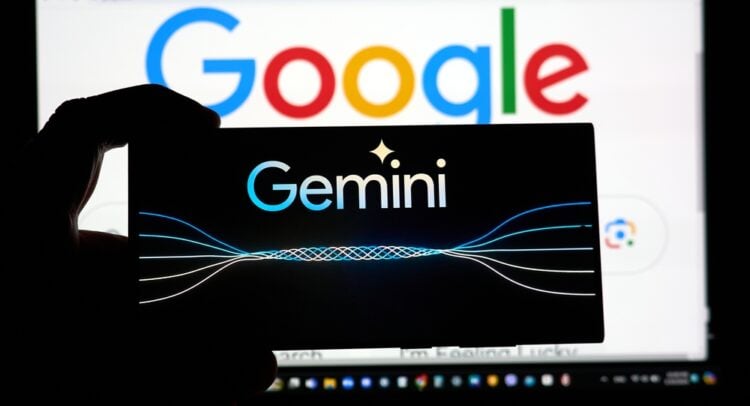Alphabet Stock (GOOGL) Surges as Gemini Stays in Second Gear

Google's Strong Performance and AI-Driven Growth
Alphabet Inc. (GOOGL) has experienced a significant surge in its stock price, climbing approximately 15% over the past five days and reaching new all-time highs at $240. This impressive performance is attributed to a strong Q2 report and a favorable ruling by District Court Judge Amit Mehta, which allows Google to avoid a potential breakup of its business units.
Elevating Your Investment Strategy
Investors looking to enhance their investment approach can take advantage of Single SparklePremium at 50% off. This platform offers powerful investing tools, advanced data, and expert analyst insights to help investors make informed decisions with confidence.
Despite the stock’s impressive gains, Google’s flagship product, Gemini, still lacks widespread market presence and has not fully maximized its revenue potential. However, considering the broader context, GOOGL stock may be poised for further upside, supported by the commercial trends of Gemini.
A Bullish Outlook on Google
I am bullish on Google, believing that the recent quarter marks the beginning of a new, AI-driven growth cycle for the tech giant rather than a peak in earnings growth. The company's strategic investments in AI have been a key driver of this optimism.
Gemini Fuels Profitable Growth
One of the primary reasons for my bullish stance on Google is the profitable growth fueled by its AI investments. In Q2, Google Cloud revenue increased by 32% year-over-year to $13.6 billion. More impressively, the operating income margin for Google Cloud expanded from 11.3% a year ago to 20.7% in Q2.
Despite higher usage costs for technical infrastructure and employee compensation, overall segment operating costs increased at a slower pace compared to Cloud revenue, indicating that the company is experiencing significant operating leverage. This suggests that Google is transitioning from high investment into profitability.
Based on these observations, I believe that Google Cloud's contribution to the company's net profit will increase gradually, leading to a notable rise in overall operating margins. In Q2, the absolute YoY revenue growth of $3.3 billion accounted for approximately 28% of the total revenue growth reported by the company. Additionally, the operating income growth of $1.7 billion accounted for more than 42% of the company's total operating income growth, highlighting the cloud segment's superior profitability compared to other business segments.
Gemini Exhibiting Early Signs of Competitive Advantages
In addition to driving profitable growth, Gemini has gained traction among consumers despite ChatGPT's first-mover advantage in the space. According to Similarweb data, by the end of May 2025, Gemini had reached six million app installs per week on Android devices, compared to less than three million for ChatGPT. Until April, however, ChatGPT dominated app installs on Android devices, suggesting that Google's extensive reach as a search engine is also contributing to Gemini's downloads.
Gemini has surpassed ChatGPT in specific reasoning tasks, such as MMLU and GSM8K benchmarks, where Gemini 2.0 Pro achieved a 92.4% accuracy rate compared to 88.7% for ChatGPT. From a consumer perspective, Gemini also offers a much larger context window, attracting many ChatGPT users to test it recently.
Aggressive AI Investments are Justifiable
Another factor driving my bullish outlook on Google is the conviction that its aggressive AI investments are well justified. Recent SEC filings reveal a sharp increase in capital expenditures, unsettling some investors. CapEx rose from $14.3 billion in Q4 2024 to $17.2 billion in Q1 2025, then surged to $22.4 billion in Q2—a 70% year-over-year increase.
At the same time, assets not yet in service jumped from about $51 billion at the end of 2024 to nearly $62 billion by Q2 2025, reflecting heavy spending on data centers, servers, network equipment, and real estate. CEO Sundar Pichai announced in July that Google plans to invest $85 billion in CapEx this year—well above prior expectations—citing soaring AI demand from both consumers and enterprises.
Is Google a Buy, Hold, or Sell?
On Wall Street, GOOGL stock carries a Strong Buy consensus rating based on 28 Buy, nine Hold, and zero Sell ratings over the past three months. The average stock price target of $233.39 implies approximately 2.5% downside potential over the next twelve months.
Google’s recent rally has brought the stock into what analysts broadly view as “fair value,” but I expect positive price target revisions once the company begins showing tangible returns from its heavy AI investments. At the Goldman Sachs Communacopia + Technology Conference, Google Cloud CEO Thomas Kurian highlighted that remaining performance obligations now total $106 billion and are growing faster than revenue—clear evidence of robust demand as enterprise customers increasingly adopt cloud and AI solutions.
From a valuation standpoint, Google still trades at a discount to its key AI rival, Microsoft (MSFT). Its forward P/E of 24 compares to Microsoft’s 32, and across other measures—such as price-to-sales and EV/EBITDA—Microsoft commands a notable premium. While that premium reflects Microsoft’s early-mover advantage in generative AI via its OpenAI partnership, the valuation gap between the two has narrowed meaningfully, suggesting Google is due for a re-rating.
Google’s AI Gains and Legal Win Set Stage for Profitable Growth
Google’s AI investments are beginning to pay off, with Gemini rapidly narrowing the gap with ChatGPT across multiple performance benchmarks and in user adoption. Yet these gains still appear underappreciated by the market, as reflected in the persistent valuation gap between Google and Microsoft.
Over the long term, Google’s sustained AI spending positions it to drive profitable growth and potentially unlock much higher share prices. Adding to the bullish case, the recent District Court ruling reduces the risk of a breakup, allowing Google to fully capitalize on the benefits of its AI strategy as an integrated business.
Post a Comment